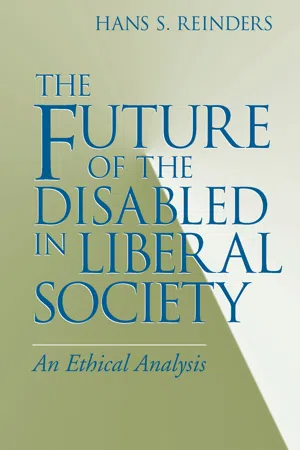
- 296 pages
- English
- PDF
- Available on iOS & Android
About This Book
The Future of the Disabled in Liberal Society questions developments in human genetic research from the perspective of persons with mental disabilities and their families. Hans S. Reinders argues that when we use terms such as "disease" and "defect" to describe conditions that genetic engineering might well eliminate, we may also be assuming that disabled lives are deplorable and horrific. Reinders points out that the possibility of preventing disabled lives is at odds with our commitment to the full inclusion of disabled citizens in society. The tension between these different perspectives is of concern to all of us as genetic testing procedures proliferate. Reinders warns that preventative uses of human genetics might even become a threat to the social security and welfare benefits that help support disabled persons and their families. Reinders also argues that this conflict cannot be resolved or controlled on the level of public morality. Because a liberal society makes a commitment to individual freedom and choice, its members can consider the diagnostic and therapeutic uses of human genetics as options available to individual citizens. A liberal society will defend reproductive freedom as a matter of principle. Citizens may select their offspring in accord with their own personal values. Reinders concludes that the future of the mentally disabled in liberal society will depend on the strength of our moral convictions about the value of human life, rather than on the protective force of liberal morality. One of the most important aspects of this book is Reinder's attention to parents who have come to see the task of raising a disabled child as an enriching experience. These are people who change their conceptions of success and control and, therefore, their conceptions of themselves. They come to value their disabled children for what they have to give. Even though disabled children and disabled adults present parents and society with real challenges, the rewards are just as real. This powerful critique of contemporary bioethics is sure to become required reading for those interested in human development, special education, ethics, philosophy, and theology.
Frequently asked questions
Information
Table of contents
- Cover
- Halft title
- Series page
- Title page
- Copyright
- Contents
- Preface
- 1: Introduction
- Part One
- Part Two
- Part Three
- Notes
- Bibliography
- Index